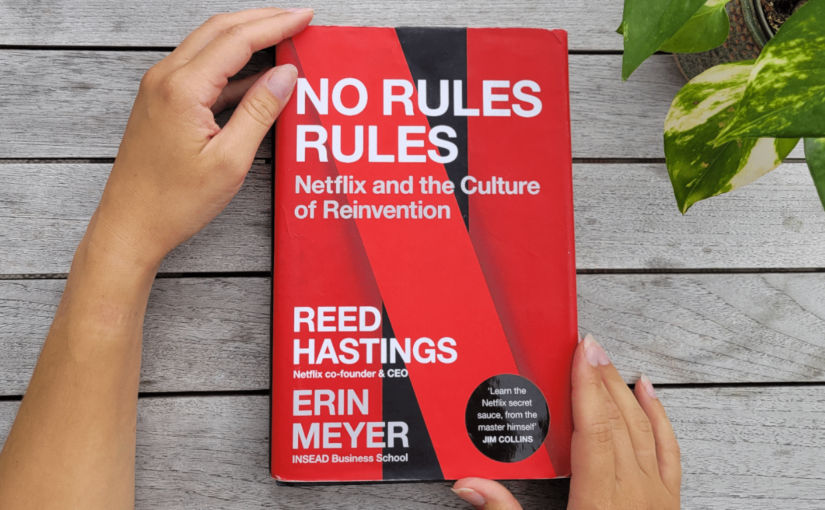I just finished reading the book No Rules Rules: Netflix and the Culture of Reinvention by Reed Hastings, co-founder and former CEO of Netflix, and Erin Meyer. It’s an extremely popular book, based on its ratings. Since I didn’t have time to read the full 320-page book, I read the 7-page summary on Blinkist. I can see why so many people like it. This book is most definitely required reading for anyone managing teams in a company. In fact, the higher you are in the org chart, the more you should read this book!

As everyone probably knows, Netflix is the wildly successful online film streaming service where people can watch movies, documentaries, TV series, and more. Its success can be attributed to many things including its ability to nimbly pivot. It started as a DVD-by-mail subscription service, then transitioned to an online streaming service. It then began licensing original content produced by other studios, and finally, it started producing its own in-house movies and TV shows. In the beginning, it was 1000 times smaller than brick-and-mortar video rental store Blockbuster yet managed to put Blockbuster out of business some 10 years later. Netflix grew 300 times faster than the NASDAQ stock index over 17 years, and a 2018 survey rated it the top place to work in Silicon Valley.
Here are the key takeaways from the book.
1: High talent density encourages employees to perform at their very best
Companies should focus on hiring and retaining highly talented people. To do so, they need to pay rock-star salaries. High performers thrive in an environment with other high performers, and this environment attracts other high performers and holds people to a higher standard. When everyone is excellent, performance skyrockets.
2. Radical candor helps Netflix employees improve, even if it can be difficult to hear
Radical candor is a vital part of Netflix’s company culture. It’s perfectly normal for people to directly contradict their bosses in meetings if they disagree with something. In fact, employees are expected to disagree. If you don’t, it’s as if you are purposely being disloyal to the company. You could help the business improve, but you’re choosing not to.
Unlike at most companies, where there’s just one annual performance review that is top-down, at Netflix, employees are encouraged to give feedback at all times. And, more importantly, they are encouraged to give feedback to their bosses, even more so than the other way around. This is very unconventional, but it actually makes a lot of sense, because the higher you are in an organization, the more likely you are to make a mistake that seriously impacts the company.
There are 4 rules to candor to make it effective:
- give feedback with the aim of helping.
- your feedback should be actionable.
- when receiving feedback, you should appreciate the effort and bravery of your colleague in speaking up.
- you should think carefully about whether or not to accept it.
3. Getting rid of useless policies made Netflix employees more accountable
Micromanaging is a waste of people’s time as is requiring employees to follow useless policies. Giving employees more freedom promotes accountability. It signals that you trust them.
4. Maintaining a talent-dense team requires a lot of intense effort.
A lot of companies talk about how their employees are a family. I’d often read new employee introduction emails where they’d say they’re excited to join the company’s family. At Netflix, they don’t consider their talent-dense team like family because they don’t believe that a particular job is something you should have for life regardless of your performance. Instead, they believe a job is something you do for a particular period of time when you’re the best person for that job and the job is the best position for you. Netflix employees are more like a professional sports team of highly talented people rather than a family of people with varying degrees of talent.
To maintain talent density, you have to do something unpleasant: fire people who are merely adequate. To minimize having to do this, it makes sense to put more effort into testing and interviewing candidates. Since firing people can’t impact their personal finances and morale, Netflix offers generous severance packages. An individual contributor gets four months’ pay, and a VP gets nine months.
5. At talent-dense organizations, dispersed decision-making is most efficient.
At most companies, the boss is there to either approve or shut down employees’ ideas. That’s leadership with control. This is a great way to limit innovation and slow down growth.
At Netflix, managers lead with context, letting employees use their own judgment to make the choice they feel is best for the company. With employees making their own decisions, senior leadership is freed up for other things.



